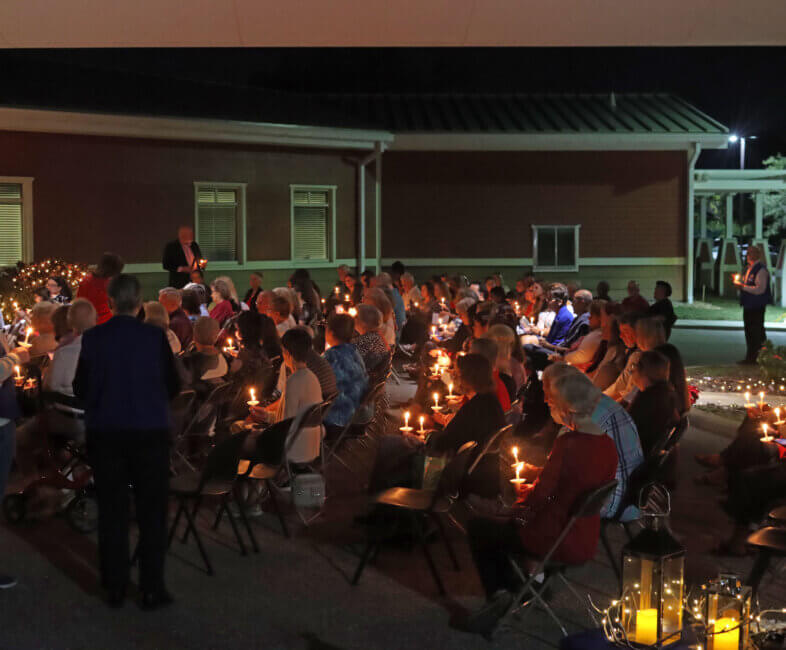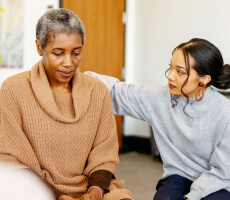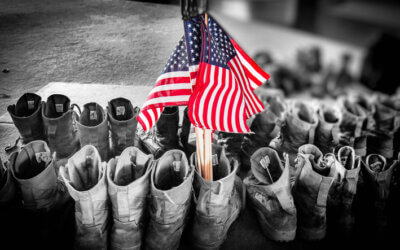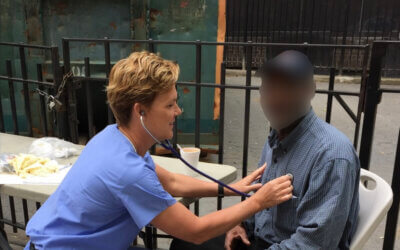The Grieving Process: Four Ways Memorial Services Help
Two bereavement specialists with Good Shepherd Hospice discuss how memorial services are beneficial to the grieving process and how one event at their organization helps families.

Losing a loved one is one of the most challenging experiences in life. The grieving process that accompanies such a loss is complex. For some, this process can last a year or longer. Memorializing a loved one with services such as funerals is an important step in the grieving process. While difficult, they provide many of the emotional benefits we could not experience during the COVID-19 pandemic. Two studies underline the importance of meaningful and supportive memorials for the bereaved; enabling them to achieve a sense of control and social support. With the help of two bereavement specialists with Good Shepherd Hospice, we’ll focus on four major benefits.
1. Memorials Bring Loved Ones Together
One of the best ways to assist a loved one who’s grieving, is to just be there. Be with them. Memorial services, such as funerals, provide loved ones with an opportunity to come together and support one another in their shared loss.
“Mourning can be described as public grieving,” said Suzy Soliday, bereavement specialist with Good Shepherd Hospice. “It’s a necessary part of the grieving process. We generally need each other and having a time to support each other is very therapeutic.”
Lights of Remembrance

Traditional funerals are not the only type of memorial ceremonies that help families support one. Good Shepherd Hospice, like many Chapters Health System affiliates, hosts holiday memorial ceremonies known as Lights of Remembrance. During these ceremonies, neighbors can come together and remember their loved ones. They can decorate memorial ornaments for their loved ones to hang on a community tree and light a candle to honor them.
“Coming together as a community and being with others who have lost loved ones, lets you know that you’re not alone,” said Esylen Stephens, a bereavement specialist with Good Shepherd Hospice. “To be able to light a candle and say their name is so special.”

Benita Leavelle’s eight-year-old son Chase participated in the ceremony hosted at the Bud and Donna Somers Hospice House. Chase lit a candle for his grandparents. His paternal grandmother Donna, passed away most recently in 2021.
“I think it gives him peace to know that there are others who are grieving just as he has,” said Leavelle. “Since 2019, he has attended the ceremony with me yearly. He is happy to help with the tree lighting, knowing that he is celebrating his grandparents.”
Chase is like many children Soliday sees at the Lights of Remembrance events.
“I was touched by their courage and desire to honor their loved ones in a community event.”
2. Sharing Stories to Remember Loved Ones
Sharing stories with others is the most common way to remember a loved one. Memorials provide families and friends that opportunity. They can discuss their loved one’s hobbies, interests and scripture they found meaningful. Nothing encapsulates this idea more than a eulogy.
“They help us see our loved ones through the eyes of someone who cared for them,” said Soliday. “Who they were as a brother, friend, husband, father, etc. It is an honor to give a eulogy and is comforting for those who hear their words. They can experience the lens through which the speaker saw the person.”
3. Acknowledge and Acceptance of the Loss
It’s important to remember not everyone grieves in the same way. In fact, recent research shows not everyone progresses through the five stages of grief step-by-step. Some people may skip stages of the grieving process. However, it’s always important to acknowledge and accept a loss, regardless of how someone grieves. Memorial services provide that opportunity.
“It takes time to integrate a loss into our lives and adjust to life without a special person,” said Soliday. “Having a special time to honor them is helpful.”
“It gives them a sense of closure and a chance to come together in that acceptance,” added Stephens. “During COVID-19, we couldn’t come together in that same way, so some people used our Lights of Remembrance ceremonies to memorialize their loved ones in that way.”
4. Having a Special Place to Honor Them
For many, grief is a protracted experience lasting for a year or more. Having a special place to visit to remember their loved one is important. Of course, many turn to traditional options such as cemeteries and memorial headstones to honor their loved ones. Some may turn to cremation and pick a special place to bury or scatter their loved one’s ashes. There are also less traditional options, which don’t strictly serve as their loved one’s final resting place. Those places are meaningful to the family and their loved one in other ways.
“As a society, many have moved away from traditional wakes and funerals,” said Soliday. “There are less traditional options available to families. They might choose to remember their loved one at a more casual setting, such as a park or backyard. Whatever kind of service they prefer, it’s important to have a meaningful place to share in those feelings.”
Chapters Health System is committed to serving the needs of its patients, families, caregivers, health providers, partners, and communities.
For more information, please call our helpful Chapters Health and HospiceHelp24® team at 1.866.204.8611 or Contact Us.
Keep Exploring
















